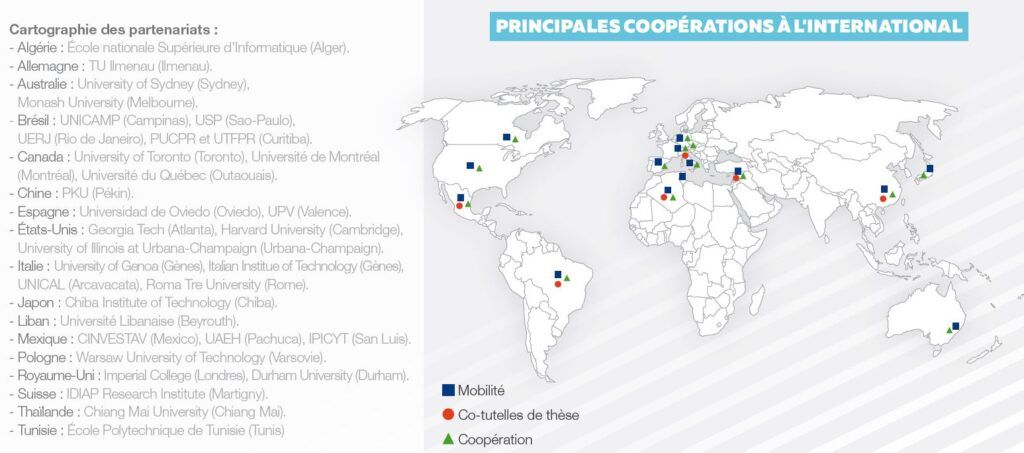International partnerships
Collaborations
Heudiasyc maintains active links with a number of European and overseas partners through collaborative projects, exchanges, and the joint supervision of theses.

LAFMIA international joint laboratory (2008–2020)
Franco-Mexican Laboratory of Computer Science and Automation (LAFMIA), the first Franco-Mexican International Joint Unit (UMI) of the CNRS, directed by R. Lozano, in partnership with GIPSA-lab laboratory and the Mexican research center CINVESTAV.
Research collaborations in the field of automation and robotics.
The mission of LAFMIA was to conduct scientific research in the following areas:
- autonomous aerial vehicles,
- autonomous underwater vehicles,
- exoskeletons and rehabilitation equipment,
- multi-criteria optimization using metaheuristics,
- ambient systems and multi-scale resource management.
Peking University and the Institute of Automation of the Chinese Academy of Sciences
Joint projects with the Sino-European Laboratory in Computer Science, Automation and Applied Mathematics (LIAMA), hosted by the Institute of Automation of the Chinese Academy of Sciences (CASIA), and Peking University’s Key Laboratory of Machine Perception in Beijing.
Between 2010 and 2015, Heudiasyc and the Key Laboratory of Machine Perception collaborated in the area of intelligent vehicles, assisted by a consultative committee of specialists from Peugeot Citroën (technical centres at Shanghai and Vélizy). This collaboration extended across a number of separate projects:
- MPR (Multimodal Perception and Reasoning), backed by INS2I within LIAMA, for four years
- PRETIV (Multimodal Perception and Reasoning for Transnational Intelligent Vehicles), backed by the French National Research Agency ANR, the i‑Trans competitive cluster, and by the NSFC in China
- a project within the Cai Yuanpei program, managed jointly by MEAE and MESRI in France and the Chinese ministry of education
- PREDIMAP, part of the regional STIC-Asie program, in partnership with the universities of Shanghai Jiaotong and Tokyo, AIT (Thailand), IGN, and INRIA
Heudiasyc maintains strong links with the National Laboratory of Pattern Recognition (NLPR) of the Chinese Academy of Sciences’ Institute of Automation, with Peking University and Beijing University of Technology, as well as with Nanjing University of Science and Technology (NUST).
Technische Universität Ilmenau
Since 2012 Heudiasyc has been collaborating on intelligent vehicles with the Technische Universität Ilmenau in Germany.
- 1 European project
- Several extended visits by researchers and PhD candidates
University of Lebanon
Collaborations with the Lebanese University, and in particular with its Faculty of Engineering, began in 1999 and since then have been strengthened in various ways:
- Joint master’s degree between UTC and the Lebanese University, in which a number of Heudiasyc members participate. The students who do the course in Lebanon enrol in parallel for the “Robotics and Intelligent Systems” (RSI) master’s at the Lebanese University and for the “Complex Systems in Interactions” (SCI) master’s at UTC. The RSI course is authorized as an alternative route to obtaining the SCI master’s. Each year Heudiasyc hosts a number of interns from the RSI course.
- Joint supervision of theses, in particular as part of the joint supervision of theses program agreed between the French universities of technology, INSA, and the Lebanese University.
- Research projects: relating to UAVs and intelligent vehicles, in particular within the framework of the Franco-Lebanese CEDRE program.
- Visiting researchers and PhD candidates.
IRP ADONIS | 2020–2025
An International Research Project (IRP) is established between UTC, the University of Lebanon, and the CNRS.
« ADONIS »: Approaches for Diagnosis and Intelligent Control of Systems.
The IRP brings together 4 partners: UTC (Heudiasyc, BMBI, Roberval), ULFG, CNRS France, and CNRS Lebanon.
Systems (industrial, biomedical, civil, transportation infrastructure, etc.) are becoming increasingly complex and vulnerable to faults, defects, and component and controller failures.
The objectives of this IRP aim to address the various constraints faced by today’s systems:
- Ensuring operation for increasingly longer durations while adhering to safety, efficiency, and environmental criteria.
- Enhancing the reliability of diagnostic, treatment, and decision-making tools.
CONTACT
Directeur | Philippe Bonnifait
Tél : 03 44 23 46 45
Mail : philippe.bonnifait@hds.utc.fr



